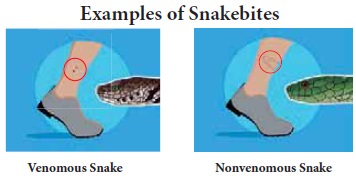First Aid - Insect Bites | 11th Nursing : Chapter 9 : First Aid
Chapter: 11th Nursing : Chapter 9 : First Aid
Insect Bites
Insect Bites
Bee, Wasp, Ant stings and other Insect bites.
Remove the sting by
scraping, never squeeze the site.
Wash the area and
apply antiseptic cream.
Keep the sting site
rested, elevated and cool.
To relieve pain and
swelling apply cold compress.
Local swelling and
irritation may last for several days.
Scorpions Bites
Scorpion stings can be
very painful and the pain may persist for several hours. Local redness and
numbness often occur.
Some people are allergic
to stings and can rapidly develop the serious condition of anaphylactic shock.
Symptoms and signs
Itching, swelling
Burning pain
Increased sensation or
numbness
Lacrimation
Salivation
Nausea and vomiting
Profuse sweating
Treatment
Apply a tourniquet
proximal to the site of the sting and release it every 5 to 10 minutes. Apply
ice pack on the region to slow down the absorption of poison.
Shift the patient to
hospital
Centipedes
Local redness, itching and pain are common.
Severe pain is sometimes experienced.
Apply antiseptic to the bite site.
Snake bite
Bites from sharp
pointed teeth cause deep puncture wounds that can carry germs far into the
tissues. Snake bite results in punctured wounds caused by the fangs of a snake.
Signs and symptoms of snake bite:
A pair of puncture
marks.
Severe burning pain at
the site of the bite
Redness and swelling
around the bite Nausea and vomiting
Difficult in breathing
and speech.
Dimness of vision.
Increased salivation
and sweating.

·
Do not wash, squeeze or puncture the bite site.
·
Apply a pressure immobilization bandage.
·
Keep the victim calm and still. Do not give food or alcohol.
·
Do not allow the victim to walk.
·
Bites to the head and body must be bandaged as firmly as
possible.
·
Do not attempt to catch or kill the snake.
Animal bites
One infection someone
might get from an animal bite is rabies, which is a serious viral infection
that attacks the brain and nervous system. If an infected animal bites a human,
they will pass on the virus, through their saliva.
Tetanus (a bacterial
infection) is also a potential risk after an animal bite.
Animal bites- First Aid Management
·
Wash the wound from the bite thoroughly with soap and warm water
as it can reduce the risk of infection from an animal bite.
·
Raise and support the wound and then cover it with a sterile
wound dressing.
·
If the wound is large or deep, then treat for bleeding.
·
If there’s a risk of rabies, then you need to get them to
hospital as fast as you can.
If the bite is from
another human, there’s also a risk of getting hepatitis or HIV/ AIDS viruses.
Related Topics